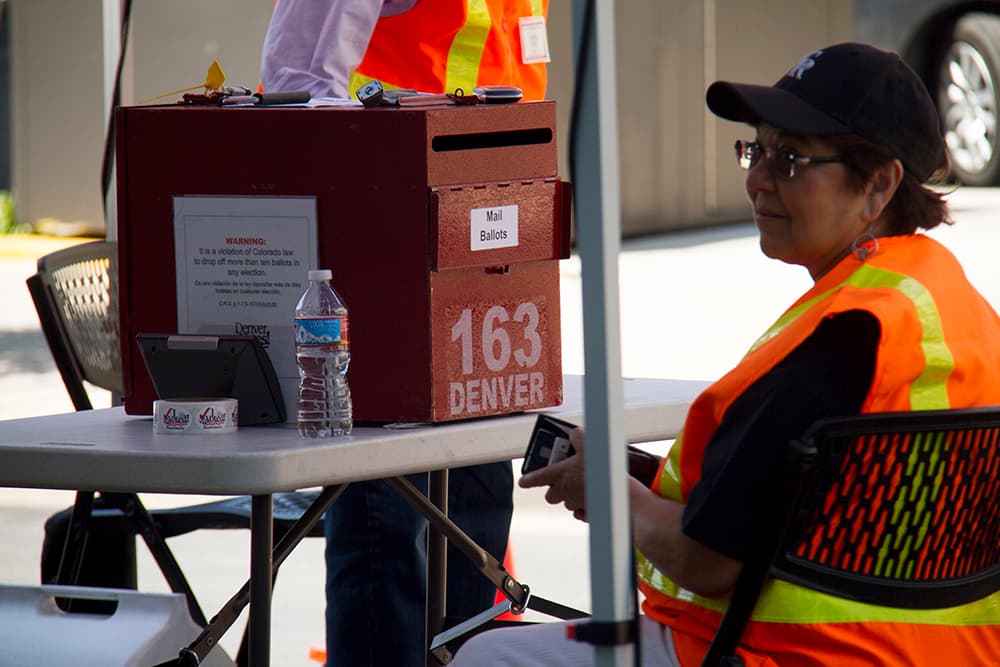Last week, the Clinton campaign brought Meg Whitman, a former Hewlitt-Packard executive and Republican candidate for governor of California, to Colorado to stump for Clinton. On Wednesday, the campaign introduced "Ralph Carr Republicans" on the steps of the courthouse named for the Republican governor of Colorado who stood up for Japanese-Americans during World War II.
In case that was too subtle, the first speaker was Terie Miyamoto, a third-generation Japanese-American whose mother was forced to leave her home in Seattle for an internment camp in Idaho and whose father served in the segregated all-Japanese 442nd regimental combat unit. Her father was awarded a Bronze Star and then in 2010, a Congressional Medal of Honor. Her brother served in Vietnam. The Miyamotos "have always stepped up to serve" but that didn't protect them from discrimination.
"Every action taken by the government towards my family was unconstitutional, racist and all based on fear and bigotry," said Miyamoto (who is unaffiliated and not Republican). "When Donald Trump says, 'What have you got to lose?' I say, 'How can you take a chance?'"
David Maddux, a registered Republican in Colorado since 1984, recalled visiting the Manzanar internment camp as a boy and being shocked that the United States ever did that to its own citizens.
"I look at the current tide of events and see that we're turning back towards that," Maddux said. " ... Some of the things that Donald Trump has said about minorities and ethnicities, people with different colors and religions, the way he's denigrated entire religions, is horrific. It deeply bothers me as someone who has never felt that way."
Maddox said he campaigned for Republican Sen. Bill Armstrong and Republican Gov. Bill Owens, but when he looks at Trump, he doesn't see a normal Republican.
"The big horror for me is some of the average, normal people telling me, 'Well, that's my party and that's who I'm going to vote for.' I need to be able to look myself in the mirror in the morning and know I've chosen who the best candidate is."
The Ralph Carr Republicans and the Meg Whitman visit are part of a broader strategy by the Clinton campaign to reach out to independents and moderate Republicans put off by Trump's extremist views and rhetoric. The New York Times has a handy list of 110 Republicans who have said publicly they won't support Trump, though not all of them have said they will vote for Clinton. There aren't any Colorado names on the list yet. Rep. Mike Coffman has distanced himself from Trump in ads where he describes himself as a different sort of Republican, but when pushed about how he'll vote, he's been coy.
A lot of Republicans have disliked the Clintons for a very long time, but Maddux said he has no qualms about voting for someone with extensive experience and an even temperament.
The focus was less on Clinton's economic plans for the country, as with Whitman's visit, and more on not starting World War III.
Rick Stoddard, a retired banker and "lifetime" member of the Republican Party, said Trump's tendency to reach for strong language and insults put the country at risk.
"What is said not only influences others but can have disastrous consequences if not thought out. To put the entire world at risk is not worth the gamble of emotional outbursts we all feel from time to time," he said.
If you didn't grow up here and take Colorado history in school or if you don't have children who learn Colorado history in school or if you've never visited the Colorado History Museum (you should!), the Ralph Carr reference might be a little obscure to you. Carr opposed the policy of internment, refused to send the many Japanese-Americans already living in Colorado to internment camps and urged Coloradans to welcome the Japanese-Americans who had been relocated from the West Coast.
This is his famous quote: "The Japanese are protected by the same Constitution that protects us. An American citizen of Japanese descent has the same rights as any other citizen. ... If you harm them, you must first harm me. I was brought up in small towns where I knew the shame and dishonor of race hatred. I grew to despise it because it threatened [pointing to various audience members] the happiness of you and you and you."
The reference isn't entirely without risk. When Democrats compare Trump's rhetoric against Mexican and Muslim immigrants to the hysteria against Japanese-Americans, Republicans like to point out that Franklin Delano Roosevelt, who used an executive order to remove Japanese-Americans from the West Coast, was a Democrat and one still awarded a place of honor in the party's pantheon.
Of course, some 40 years later, when Congress passed a bill awarding reparations to those who had been interned, most Republicans opposed it, though President Ronald Reagan signed it into law.
And it was that fear of the other that convinced Maddux he couldn't vote for Trump. His turning point, he said, was the convention speech.
"His speech scared me," he said. "It was full of the bulletpoint rhetoric of every fascist in history. We're in terrible times. The enemy is people who don't look like us. I and I alone can stop it with law and order."
Thirty days ago, he changed his party affiliation, he said.
To unaffiliated?
"No. Democrat."













